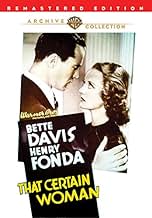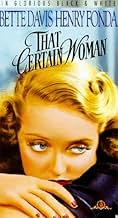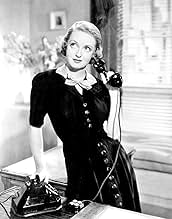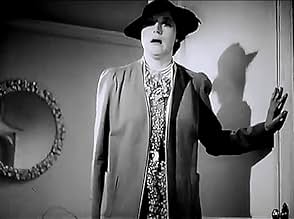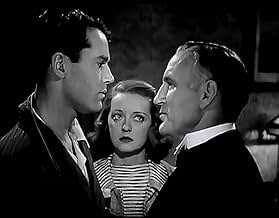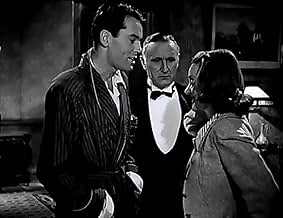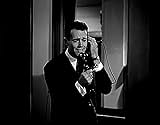NOTE IMDb
6,4/10
1,8 k
MA NOTE
Ajouter une intrigue dans votre langueMary Donnell, a young legal secretary with a past, elopes with a client's son, but his father has the marriage annulled without knowing she's pregnant.Mary Donnell, a young legal secretary with a past, elopes with a client's son, but his father has the marriage annulled without knowing she's pregnant.Mary Donnell, a young legal secretary with a past, elopes with a client's son, but his father has the marriage annulled without knowing she's pregnant.
- Réalisation
- Scénario
- Casting principal
- Récompenses
- 1 victoire au total
Katharine Alexander
- Mrs. Rogers
- (as Katherine Alexander)
Mary Philips
- Amy
- (as Mary Phillips)
Richard DeNeut
- Boy
- (as Dickie DeNeut)
John Hamilton
- American
- (scènes coupées)
Edward Keane
- Opposing Counsel
- (scènes coupées)
Avis à la une
Here, Davis plays a secretary, Mary Donnell, with a past: she was once married to a mobster when she was very young. He is now dead but the press will not let her forget her past and move forward. Jack Merrick , Jr. (Henry Fonda) is in love with Mary. He marries her—promising to stand on his own feet rather than living off of his wealthy father, (Donald Crisp). But Jack's father first forbids the marriage then, after they get married, he has it annulled, and sweeps Jack off to Europe.
However, Mary has Jack's baby and names him Jackie. She is emotionally supported by her maid, Amy (Mary Philips)-who here plays a role something like Thelma Ritter would play in later movies. Mary is also supported by her understanding boss, Lloyd Rogers (Ian Hunter), who has an unhappy marriage and is not-so-secretly in love with Mary. But, his love is unrequited.
As the years pass and little Jackie grows, Mary remains in love with Jack: she can't get him out of her mind. Jack marries in Europe and he and his wife, 'Flip' (Anita Louise), are in a bad car accident that leaves her in a wheelchair for life. When Jack and Amy return to America, they both re-enter Mary's life: Jack is introduced to, and falls in love with, his 4-year-old son. 'Flip' makes a point of visiting Mary to ask her to marry Jack so that he can have a 'full life' with Mary and little Jackie.
This is one of those Bette Davis melodramas in which she is asked to make personal sacrifice(s), but the movie has too MANY of these moments. In fact until the end, we are left wondering who she will have to sacrifice: Jack?—Jackie?—both?-neither? The only 'villains' of this movie are Jack's father, who continually foils the love between Mary and Jack, and the tabloid newspaper reporters who won't leave Mary alone.
Surprisingly, the other women, of the movie (Mrs. Rogers, Flip, and even Amy)--who should resent Mary--are always way TOO understanding towards her. Not only does the movie suffer from an excess of these moments but the ending is WAY contrived too.
It's too bad, because the movie seemed to show some promise at the beginning. All this aside, Bette Davis' acting is still the great stuff that we have learned to expect from her.
However, Mary has Jack's baby and names him Jackie. She is emotionally supported by her maid, Amy (Mary Philips)-who here plays a role something like Thelma Ritter would play in later movies. Mary is also supported by her understanding boss, Lloyd Rogers (Ian Hunter), who has an unhappy marriage and is not-so-secretly in love with Mary. But, his love is unrequited.
As the years pass and little Jackie grows, Mary remains in love with Jack: she can't get him out of her mind. Jack marries in Europe and he and his wife, 'Flip' (Anita Louise), are in a bad car accident that leaves her in a wheelchair for life. When Jack and Amy return to America, they both re-enter Mary's life: Jack is introduced to, and falls in love with, his 4-year-old son. 'Flip' makes a point of visiting Mary to ask her to marry Jack so that he can have a 'full life' with Mary and little Jackie.
This is one of those Bette Davis melodramas in which she is asked to make personal sacrifice(s), but the movie has too MANY of these moments. In fact until the end, we are left wondering who she will have to sacrifice: Jack?—Jackie?—both?-neither? The only 'villains' of this movie are Jack's father, who continually foils the love between Mary and Jack, and the tabloid newspaper reporters who won't leave Mary alone.
Surprisingly, the other women, of the movie (Mrs. Rogers, Flip, and even Amy)--who should resent Mary--are always way TOO understanding towards her. Not only does the movie suffer from an excess of these moments but the ending is WAY contrived too.
It's too bad, because the movie seemed to show some promise at the beginning. All this aside, Bette Davis' acting is still the great stuff that we have learned to expect from her.
This is a superior and under-rated "woman's picture" that really has all the elements of the classic weeper: star-crossed lovers, twists of fate, and self-sacrifice. It also has a sterling performance from Bette Davis which gives a strong indication of why she would soon be a superstar and regarded as the screen's best actress: Her belief in a character could suffuse it with passion and poignancy and transcend the shallowness of the accompanying story. She's supported by an excellent cast - Henry Fonda (in a basically thankless role), the ever-reliable Donald Crisp (her showdown scene with him oddly foreshadows similar scenes with Gladys Cooper in NOW, VOYAGER), Mary Phillips (in a role that in a later version would obviously have gone to Thelma Ritter), who was, at the time, Mrs. Humphrey Bogart (in the same year's MARKED WOMAN Davis would appear with Mayo Methot, the next Mrs. B., and Ian Hunter. Edmund Goulding, who excelled at this kind of thing, wrote and directed it - he would later direct Davis in two other notable soapers, DARK VICTORY (one of her most celebrated performances, as Judith Traherne), and THE GREAT LIE (for which Mary Astor won a Best Supporting Actress Oscar). It's all served up in the best Warner Bros. tradition, but doesn't seem to be as well-remembered as other such films of the era, such as MAGNIFICENT OBSESSION, STELLA DALLAS, or MY FOOLISH HEART.
I actually liked this picture. The story loosely parallels that of Madame Butterfly...and if you see it in that light, it doesn't seem all that over the top. I wouldn't be a bit surprised if the writer had the idea of updating Madame Butterfly...I visually these guys in wrinkled shirtsleeves bending over their old Royal typewriters chomping on cigars..."Yeah...Madame Butterfly...that's the ticket...only she's not a prostitute, that won't work....but a fallen woman...but a noble one....she's a bootlegger's widow...yeah! that's the ticket...she marries a playboy, he dumps her, marries someone else...she waits for him....keep the faithful maid in the plot...has a kid....the husband comes back...remarried....she sends the kid off to live with her ex and then offs herself....yeah! It'll be a hit! Not a dry in the house."
I actually realized the similarity only in the last 15 minutes of the film when I got that awful yet familiar feeling in the pit of my stomach which always anticipates a mother's pending self-sacrifice. When Butterfly sees the American wife for the first time standing outside her little house on hill in Japan and realizes who she is and why she's there...it's really heartbreaking.
Anyway, despite the melodrama, the performances That Certain Woman are really very good, especially Davis's. She was a very intelligent actress, and understood what the camera would catch.
So, maybe you don't need to OWN this video, but I wouldn't disregard it entirely. Then go out and rent Frédéric Mitterrand's beautiful 1995 film of the opera. Heart-wrenching...
I actually realized the similarity only in the last 15 minutes of the film when I got that awful yet familiar feeling in the pit of my stomach which always anticipates a mother's pending self-sacrifice. When Butterfly sees the American wife for the first time standing outside her little house on hill in Japan and realizes who she is and why she's there...it's really heartbreaking.
Anyway, despite the melodrama, the performances That Certain Woman are really very good, especially Davis's. She was a very intelligent actress, and understood what the camera would catch.
So, maybe you don't need to OWN this video, but I wouldn't disregard it entirely. Then go out and rent Frédéric Mitterrand's beautiful 1995 film of the opera. Heart-wrenching...
Mary Donnell (Bette Davis) has a checkered past as a gangster's young widow. Now, she's lawyer Lloyd Rogers' secretary. She falls for wealthy playboy client Jack Merrick (Henry Fonda) and they get a quickie marriage. His father disapproves of her.
It's a melodrama with star Bette Davis and future star Henry Fonda. Bette is able to keep the story moving with her superior acting. Fonda is a little miscast although this is very early in his career. He hasn't settled into his everyman genuineness. He's still a good romantic lead. He isn't able to bring out the flaws in his character. In the end, this is mostly about Bette and she makes this work.
It's a melodrama with star Bette Davis and future star Henry Fonda. Bette is able to keep the story moving with her superior acting. Fonda is a little miscast although this is very early in his career. He hasn't settled into his everyman genuineness. He's still a good romantic lead. He isn't able to bring out the flaws in his character. In the end, this is mostly about Bette and she makes this work.
Secretary Bette Davis has her dishonorable past unearthed after a reporter breaks the story that she's the widow of a notorious gangster once involved in the St. Valentine's Day Massacre; this leads to the quick dissolution of Davis' even quicker marriage to Henry Fonda, but not before Bette can conceive a child! A few dry, amusing wisecracks in this remake of the silent drama "The Trespasser"--and some unintended laughs and head-scratching details as well. Davis keeps refusing offers of cigarettes (!), she types a letter to Fonda we never get to read, she packs her kid off without his toys and then blows forlornly on his whistle. The kid is a solemn tyke who seems to have a fixation on being a sailor, even while Fonda's new wife pays Davis a visit (in a wheelchair!) and trades confessions with her in front of a roaring fire which never seems to die down. Busy programmer would not be of much interest were it not for Bette's terrific performance; she's serious and focused--and sensitive when she should be--and she grounds this story in a bit of reality. Henry Fonda and the supporting players are also very good, especially Mary Phillips as Amy. The film opens confusingly and takes a while to get its bearings, yet the sequence where Bette meets her father-in-law for the first time is a superbly controlled dramatic moment in which everyone excels. Not a particularly witty or gripping picture, but certainly not bad, either. **1/2 from ****
Le saviez-vous
- AnecdotesWith Bette Davis rising quickly through the ranks at Warner Brothers, she was able to choose her leading men, and for Une certaine femme (1937) she chose Henry Fonda. Their lives had intersected a decade earlier when they worked in the same New England summer stock company. Even before that portion of their lives, they had met when Fonda gave the 17-year-old Davis a tour of Princeton University. One night, Fonda later wrote, while he and a friend took Davis and her sister out for a tour of the campus by moonlight, he nervously gave Davis an innocent kiss on the lips. A few days later he received a letter from her: "I've told mother about our lovely experience together in the moonlight. She will announce the engagement when we get home." Fonda was so naïve that he wasn't sure at first whether this was a joke! Davis remembered and liked Fonda enough to request him for this film and then again for L'insoumise (1938).
- GaffesThe screen shows a newspaper page with headlines, photographs, and a box in large type, all part of a full-page gangster story. However, only some of the text that can be seen around the edges is part of the story. The rest is "dummy" type, about clothes for college men or electrical equipment.
- Citations
Lloyd Rogers: [to Mary] Money! I've got loads of it, and I'm one of the unhappiest men in the world!
- Crédits fousThe opening credits roll up.
- ConnexionsFeatured in Breakdowns of 1938 (1938)
- Bandes originales'Cause My Baby Says It's So
(1937) (uncredited)
Music by Harry Warren
Played during the scene at the bar
Meilleurs choix
Connectez-vous pour évaluer et suivre la liste de favoris afin de recevoir des recommandations personnalisées
- How long is That Certain Woman?Alimenté par Alexa
Détails
- Durée
- 1h 33min(93 min)
- Couleur
- Mixage
- Rapport de forme
- 1.37 : 1
Contribuer à cette page
Suggérer une modification ou ajouter du contenu manquant


